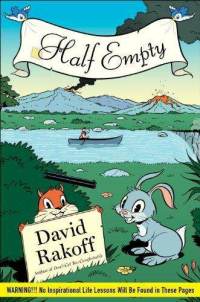For years, I have had to endure countless people telling me how much better my consistently unfulfilling life would be if I were to simply adapt a more positive outlook. Having never believed this statement to be factual, naturally I was intrigued when I heard of a book which took comedic aim at debunking the notion that optimism is directly related to happiness.
And while Half Empty, the new book by acclaimed humorist David Rakoff wasn’t exactly what I expected it to be, it was an intriguing and consistently entertaining book about the author’s misanthropic life.
Review:
While Rakoff does do an evaluation of both positive and negative thinking, this isn’t a book about pessimism per say. While it begins and ends with analytical discussions about how one’s outlook tends to have no specific outcome on their ability to survive (including a description of a health scare which nearly resulted in the author loosing an arm), the greatest bulk of material comes from essays from Rakoff’s personal experiences.
While what I got wasn’t entirely what I was expecting, I still found Half Empty to be thoroughly enjoyable. Rakoff gives funny and very detailed accounts of his exploits at, among other places, a “house of the future” and a poorly planned porno convention.
The best portion of the book for my money is when Rakoff gives perhaps the most dead on evaluation of the dreadful experience that is the writing process.
Having recently been sent into a suicidal depression after my 2,563rd failed attempt at creating something worthwhile*, I can attest to the notion that writing “always, always only starts out as shit: an infant of monstrous aspect; bawling, ugly, terrible, and it stays terrible for a long, long time (sometimes forever).”
It goes to show why some people write best sellers and others write reviews for microwavable cheeseburgers.
If it weren’t obvious enough by its warning that “no inspirational life lessons will be found in these pages,” this book isn’t for everyone. Rakoff pulls no punches, and the results can sometimes get a bit nasty.
The book’s most vicious account regards a feud with late author Olivia Goldsmith (she’s not mentioned by name, but a quick Wikipedia strongly suggests her to be the target). After detailing their relationship up until Goldsmith’s death via a botched plastic surgery proceedure, Rakoff not-so-proudly recalls asking a friend if they believed Goldsmith’s death would affect the quality of her writing.
But even in its snarkiest moments, the book never becomes too mean, primarily due to Rakoff’s own sense of self-awareness. He makes several cunning and critical remarks about a vast array of topics, but never to the point where he became overbearingly holier-than-though, and his ability to straddle that line is ultimately what makes this book worth reading.
Final Words:
Half Empty is the work of a top-flight storyteller who is clearly not shy about discussing his displeasure and discomfort at various events. If you can tolerate your humor being more than a bit on the bleak side, David Rakoff is an author worth seeking out.
Final Score: 8.5/10
*For anyone who may express concern about the suicide remark, don’t worry, these feelings ended once the Chicago Bears clinched the NFC North, and seeing as how their season won’t end until January 15 at the absolute earliest, there is no cause for alarm anytime before that date.

